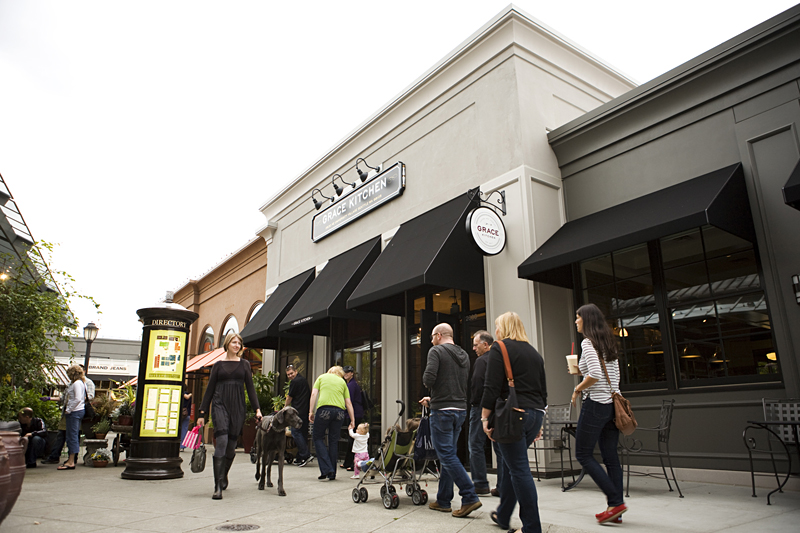After an afternoon spent wiggling in and out of peplum blouses and comparing the merits of skinny jeans to jeggings, most shoppers are ready to sit down or head home. Since retailers heartily hope customers won’t pursue the latter strategy, they’ve long been fond of ploys to keep potential spenders on the premises. Marshall Field’s Harry Selfridge—the retail visionary credited with the phrase “the customer is always right”—outfitted his stores with first-aid stations, where nurses bandaged wounds incurred during nasty skirmishes with wire hangers, as well as libraries and “silence rooms” that promised to cloak overstimulated shoppers in meditative calm. As early as the 19th century, department stores installed dental offices, beauty salons, nurseries, post offices, and rooftop gardens.
But the most lasting innovation may have been the in-store restaurant. Macy’s opened a tearoom in 1878, and Philadelphia’s majestic Wanamaker’s followed suit four years later with an oyster and ice-cream shop. In 1911, the store introduced the Grand Crystal Tea Room, among the largest dining rooms on the planet. Philadelphians were so taken with the pâté de foie gras and cream of asparagus soup served in the 1,400-seat restaurant that many of them patronized the place even when they didn’t need a new hat.
While the drumbeat of commerce is always audible at a shopping-center eatery, the most successful examples of the genre—from the Grand Crystal Tea Room to the Rainforest Cafe—somehow manage to cultivate a sense of refuge. At the best mall restaurants, shoppers can shove their woven-handled shopping bags into a booth’s back corner and temporarily think about something other than swelling credit-card balances. They’re swept up in the madcappery of themed decor or the civilizing influence of chardonnay, which does much to restore dignity lost to ill-fitting swimsuits and too-chipper sales clerks.
Sadly, Grace Kitchen, the newest sit-down restaurant in University Village, doesn’t work this way. There are a few decent dishes on the please-all-comers menu of sandwiches and fairly priced entrées, but the discombobulated service and edible miscues distract mightily from the crusade for relaxation. Judging by the exasperated sighs I heard from diners at nearby tables, the restaurant too often rattles when it should re-energize.
Yet for all its flaws, I wouldn’t hesitate to steer shoppers with preservation-worthy parking spots to Grace Kitchen for a burger and fries or a plate of deviled eggs. A glance at the red-neon Johnny Rockets sign visible through the restaurant’s side windows provides confirmation that a meal could be worse.
Cal Fairbanks—late of Cedarbrook Lodge, a conference center near the airport—is the chef at Grace Kitchen, although his presence has been downplayed in the local food press. (And perhaps at the restaurant, too: When I called to inquire who was serving as head chef, the staffer who answered the phone didn’t know.) Publicity has instead centered on consultant Jerry Traunfeld, the James Beard–award-winning Herbfarm vet who now runs Poppy.
A Venn diagram for the two restaurants would probably look more like a toppled number eight than a MasterCard symbol, but there are whiffs of Poppy’s pluckiness at Grace Kitchen. Quinoa cakes might not be considered daring on Capitol Hill, but for Tommy Bahama shoppers, they’re probably as wonderfully weird as blueberry-anise-hyssop pickles. The crunchy cakes aren’t bad: Served alongside salmon and paired with eggplant for a vegetarian plate, the sweet pellets of grain taste like South American falafel.
Still, franchise-restaurant fans shouldn’t have any trouble dodging potentially unsettling items such as eggplant-walnut spread and a fried-eggplant sandwich. There’s cilantro on the grilled-chicken sandwich and optional onion chutney on the burger, but the kitchen hasn’t messed with its Cobb salad, BLT, or macaroni and cheese. And deviled eggs, buried beneath a bramble of rosemary, sport a lovely mustardy filling flecked with salmon.
Yet the restaurant means to make its comfort foods sophisticated, a goal advanced by the boxy dining room’s decor. First-time guests, confronted by the bluish-gray wooden booths and weathered ceiling lamps, might wonder if they’ve wandered into Restoration Hardware by mistake. A looming wall-sized cupboard near the front door does little to undermine that impression, although it does give guests something to examine while they endure what tends to be a very long wait for a hostess.
Unlike many Seattle restaurant workers, Grace Kitchen’s staffers are eager to apologize for service slights. Unfortunately, they frequently have reason to do so.
On both nights I dined at Grace Kitchen, the young service crew—clad in collegiate-style gray T-shirts reading “Grace”—was desperately in need of managerial direction. The servers’ bewilderment was so complete that it seemed utterly plausible that they’d stopped by the restaurant on their way to J. Crew and decided to pick up a few tables.
Grace Kitchen offers a signature cocktail menu, and it’s apparently wise not to stray too far from it. After consulting the bartender, a server who took my order for a Beefeater martini returned to tell me the restaurant didn’t stock my chosen gin: I had my choice of Maker’s Mark (bourbon, not gin) or Glenlivet (Scotch). After we sorted out the spirits confusion, she returned with a bubbly cocktail bearing a fat wheel of lime. Since my drink wasn’t immediately recognizable as a martini, I asked which vermouth the bartender had used. “Bombay Sapphire!”, she said brightly.
That incident could be pinned on the bartender who sent our hapless server back with bad information, or managers who didn’t properly train their front-of-the-house staffers in alcohol service, but other problems belonged solely to the servers. On my first visit, a requested beverage never appeared, but our entrées arrived quickly—followed almost immediately by our first-course appetizers and second-course salads. Our server claimed the entrées were remade, but the veneer of char on my overdone salmon and accompanying quinoa cakes suggested the plate had been broiled back to piping-hot status.
I’m almost certain the salads suffered from waiting out our first-course feasting. A lightly dressed Caesar salad goosed with plump anchovies remained relatively perky, but a house salad scattered with radishes and tossed with a slightly sour Green Goddess dressing was a miserable pile of wilted greens.
While our future dishes were dying, we fought away fruit flies (the tabletop Gerber daisies are magnets for them) and tore through a grilled half-artichoke with tough, gangly leaves, made slightly more palatable by a nicely refined oregano-mayonnaise dip. Undercooked chicken wings with rubbery skins, splattered with a vinegar-rich, Sriracha-like sauce, smacked of rosemary.
If there’s a consistent flaw in Grace Kitchen’s cooking, it’s the overly exuberant use of fresh herbs. Freshness is a quality to salute at a mall restaurant, but herbs are applied here with a triumphant window gardener’s enthusiasm. The only flavor in a bowl of tomato soup is basil, and parsley jostles with crushed red pepper for the honor of overwhelming an otherwise pleasant dish of linguine with clams.
It’s not all grim, though. Warm, lemony goat cheese packed in a pair of mini-tarts may smack of a second-semester culinary-school project, but it still makes for a likably goopy starter. The fries are admirably crispy, albeit often served cold. And the “standard burger,” featuring a compact grass-fed beef patty, wrinkly roasted tomatoes, butter-lettuce leaves, and Beecher’s cheese, is elevated by an excellent eggy bun.
Grace Kitchen isn’t the Grand Crystal Tea Room: If you’re not already prowling University Village, the restaurant doesn’t belong on your to-eat list. For diners stranded at the shopping plaza, though, the restaurant is the edible equivalent of a store clearance rack: It’s disorderly, and dominated by ho-hum fare. But it’s still worth checking out.
Price Guide
Grilled artichoke $4
Goat cheese tart $6
Chicken wings $7
Caesar salad $9
Burger $11
Salmon $17








